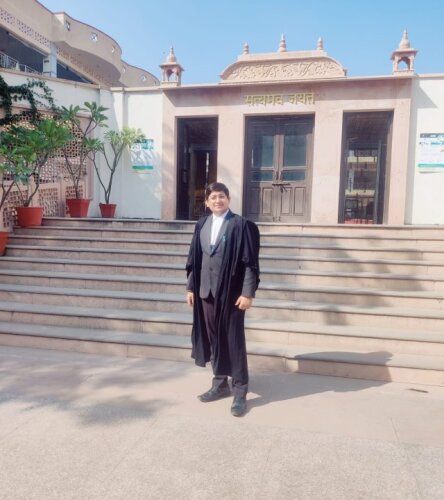Best Sex Crime Lawyers in Jaipur
Share your needs with us, get contacted by law firms.
Free. Takes 2 min.
List of the best lawyers in Jaipur, India
About Sex Crime Law in Jaipur, India
Sex crimes are serious offenses in India that include acts such as rape, sexual assault, molestation, and other forms of sexual misconduct. In Jaipur, as in the rest of India, these crimes are governed by stringent laws aimed at protecting victims and punishing perpetrators. The legal framework is designed to address the severity of sex crimes and provide avenues for victims to seek justice. Understanding the intricacies of these laws is crucial for anyone involved in or affected by such situations.
Why You May Need a Lawyer
There are several circumstances where individuals may require legal assistance in matters related to sex crimes:
- Accusations or Charges: If you are accused or charged with a sex crime, legal representation is essential to navigate the complex legal system and ensure your rights are protected.
- Victim Support: Victims of sex crimes often require legal assistance to file complaints, seek restraining orders, and pursue justice against the perpetrator.
- Legal Advice: Understanding your rights and the legal protections available to you can be challenging without professional guidance.
- Family Matters: In cases where sex crimes affect familial relationships, such as child abuse or domestic violence, legal intervention may be necessary to ensure the safety and well-being of the affected individuals.
Local Laws Overview
The legal framework governing sex crimes in Jaipur falls under the broader umbrella of Indian Penal Code (IPC) and other related legislation:
- Indian Penal Code (IPC): Sections such as 375 (rape), 354 (assault or criminal force to woman with intent to outrage her modesty), and 377 (unnatural offenses) are crucial in sex crime cases.
- Protection of Children from Sexual Offences (POCSO) Act: This act specifically addresses sexual crimes against minors and prescribes stringent penalties.
- Criminal Law (Amendment) Act, 2013: Also known as the Nirbhaya Act, this amendment introduced more severe punishments for sex crimes and expanded the definition of sexual offenses.
- Sexual Harassment of Women at Workplace (Prevention, Prohibition, and Redressal) Act: This law addresses sexual harassment in professional settings, providing a mechanism for women to report and seek redressal.
Frequently Asked Questions
1. What constitutes a sex crime in Jaipur, India?
Sex crimes include a range of offenses such as rape, molestation, sexual harassment, and any non-consensual sexual activity.
2. How do I report a sex crime in Jaipur?
Sex crimes can be reported to the local police station. Alternatively, you can file a complaint online through the Rajasthan Police’s e-portal.
3. What should I do if I am falsely accused of a sex crime?
If falsely accused, it is crucial to seek legal advice immediately to prepare a defense and protect your rights throughout the legal process.
4. Can minors be charged with sex crimes in Jaipur?
Yes, minors can be charged under the Juvenile Justice (Care and Protection of Children) Act, 2015. The case will be handled by the Juvenile Justice Board.
5. What protections are available for victims of sex crimes?
Victims can access various protections, such as police protection, anonymity in legal proceedings, and counseling services.
6. How long does a typical sex crime case take in court?
The duration varies depending on the complexity of the case, but sex crime cases can take several months to years to conclude.
7. Is there a statute of limitations for reporting sex crimes?
Certain sex crimes, like rape, have no statute of limitations, meaning they can be reported at any time.
8. Can evidence from medical examinations be used in court?
Yes, evidence from medical examinations is crucial and can significantly impact the outcome of the case.
9. Do victims have to face the perpetrator in court?
Victims may have to testify, but measures can be taken to protect them from direct confrontation, such as testifying via video conference.
10. What legal recourse exists for workplace sexual harassment?
The Sexual Harassment of Women at Workplace Act provides avenues for victims to file complaints and seek redressal through internal committees or legal action.
Additional Resources
Several resources and organizations can provide assistance and information:
- Rajasthan Police: For reporting crimes and seeking police protection.
- The Rajasthan State Commission for Women: This body provides support and advocacy for women's rights and can assist in sex crime cases.
- NGOs like HelpLine Foundation: These organizations offer counseling, support services, and legal assistance for victims of sex crimes.
- Legal Aid Services: Various legal aid clinics provide free or low-cost legal services to those in need.
Next Steps
If you require legal assistance in a sex crime case, here are the steps to follow:
- Consult a Lawyer: Seek professional legal advice to understand your rights and the best course of action.
- File a Report: If you are a victim, report the crime to the appropriate authorities as soon as possible.
- Gather Evidence: Collect any evidence that may support your case, including medical reports, witness statements, and communication records.
- Seek Support: Reach out to support organizations for counseling and additional assistance.
- Prepare for Legal Proceedings: Work with your lawyer to prepare for court appearances and other legal requirements.
Remember, taking prompt and informed action can significantly affect the outcome of your case. Legal professionals and support organizations are there to help you through this challenging time.
Lawzana helps you find the best lawyers and law firms in Jaipur through a curated and pre-screened list of qualified legal professionals. Our platform offers rankings and detailed profiles of attorneys and law firms, allowing you to compare based on practice areas, including Sex Crime, experience, and client feedback.
Each profile includes a description of the firm's areas of practice, client reviews, team members and partners, year of establishment, spoken languages, office locations, contact information, social media presence, and any published articles or resources. Most firms on our platform speak English and are experienced in both local and international legal matters.
Get a quote from top-rated law firms in Jaipur, India — quickly, securely, and without unnecessary hassle.
Disclaimer:
The information provided on this page is for general informational purposes only and does not constitute legal advice. While we strive to ensure the accuracy and relevance of the content, legal information may change over time, and interpretations of the law can vary. You should always consult with a qualified legal professional for advice specific to your situation.
We disclaim all liability for actions taken or not taken based on the content of this page. If you believe any information is incorrect or outdated, please contact us, and we will review and update it where appropriate.














